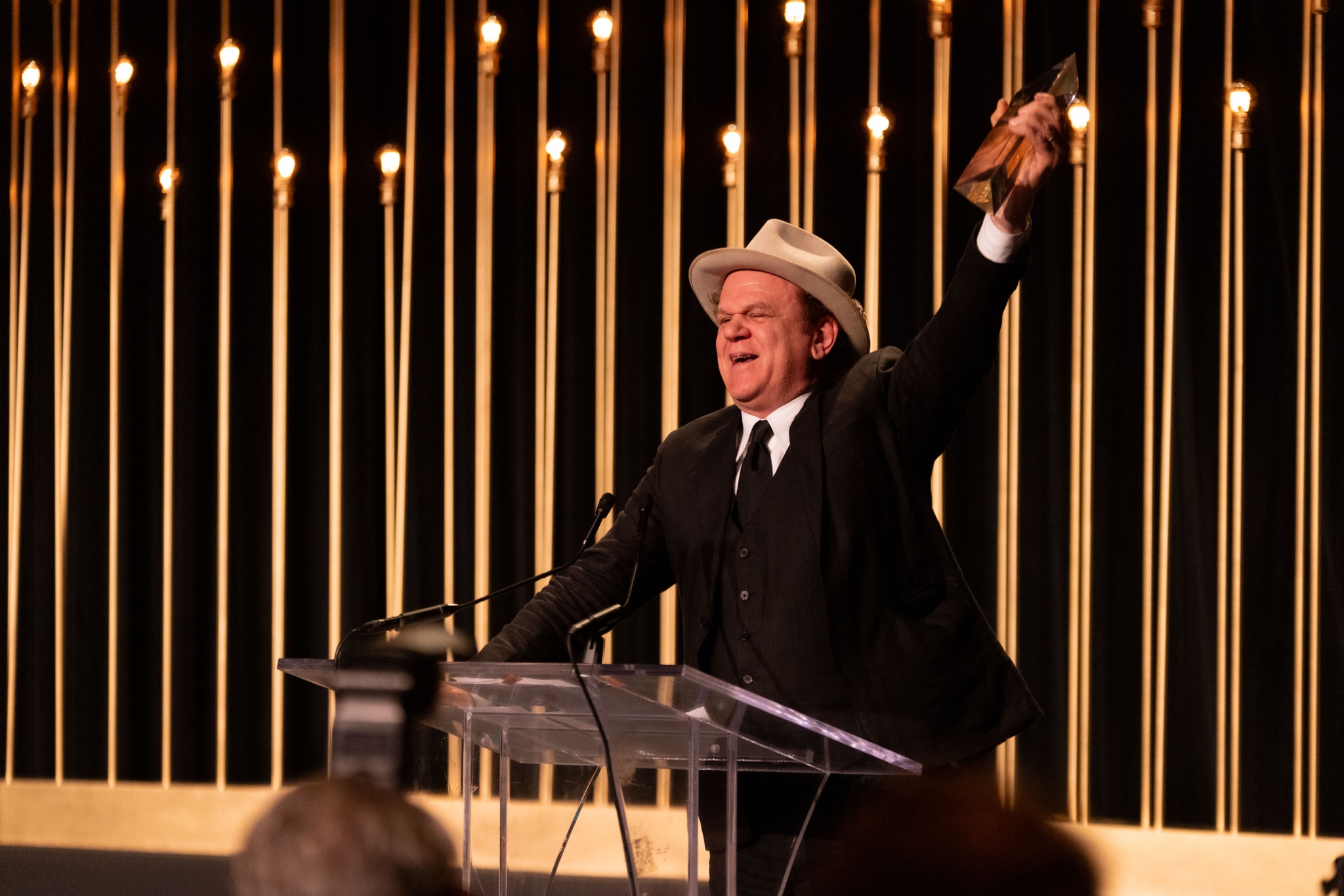It was a celebration that, in some sense, had been sixty years in the making. It was also necessary. It’s been a rough year for festivals: the Berlinale witnessed deep political divides around its response to Gaza, Toronto International Film Festival is still reeling from losing Bell (its biggest sponsor), the entire programming team for Hot Docs resigned, and Sundance is considering leaving Park City, Utah. The Chicago International Film Festival, on the other hand, which has continued to provide robust and varied programming of major international titles, is steadily moving forward.
This past Saturday, Cinema/Chicago threw the festival a swank soirée. Through its tributes to filmmaker Jennifer Reeder and Oscar-nominated actor John C. Reilly, the festival sought to salute both local luminaries and the organization’s six decades in business. It also, through its fundraising efforts, expressed through a rapid-fire live auction, looked forward toward the future.
Many gleeful attendees, bedecked in smart tuxedos and textured, multi-hued dresses and gowns, braved the rainy summer evening to fill the Geraghty—a spacious, dynamic event space on the city’s southwest side. Upon entry, there was the glitzy, bright red carpet. Further out in the room the Senya Rogers-Kaufman Trio turned out busy jazz rhythms that bounced off the walls into the ear like honeyed drips of joy. It was the laidback opening to a ceremony helmed by soirée chair and Executive Committee member of Cinema/Chicago’s governing board, Brenda Robinson.

During the dinner, Al Roker, the weather anchor for NBC’s Today, played host. A mix of blue material and winking double entendres, which often, impishly, poked fun at the audience, served as Roker’s acidic material. It was a verbal barrage that took many by surprise, often causing the night to feel like an unintended roast rather than an easygoing party. When the crowd proved listless to Roker’s jokes, he quipped about the event’s planned late-night desert and dance that he’d never seen dead people dance before. Still, in between glasses of wine, the kind of copious alcohol that loosens the spirit, Mr. Roker’s bits and banter did make headway. Following a giving speech by Robinson and a congratulatory note from Charles Dreoge, Cinema/Chicago’s Chair of its Governing Board of Directors—the award giving began.
Known for stylishly bloody, feminist genre films like “Knives and Skin” and “Night’s End,” Chicago writer/director Jennifer Reeder received the festival’s Tour de Force Award. Before she took to the stage to accept the prize, a thoughtful video brimming with heartwarming testimonials from the likes of Alicia Silverstone—who starred in the Reeder’s “Perpetrator”—praised her career, vision, and voice. Reeder’s speech was playful, structured like a script, replete with fade-ins, dialogue, and even a beat for an applause.
Throughout the night, my eyes glanced around the room. I caught sight of “Hoop Dreams” director Steve James, “Return to Seoul” filmmaker Davy Chou, and of Michael Kutza—the festival’s founder—who sixty years ago conceived of the festival with silent screen star and co-founder Colleen Moore. Along the way, the festival’s artistic director Mimi Plauché and its managing director Vivian Teng stepped on stage to talk about the festival’s adventurous summer screenings, its CineYouth festival and its Community Cinema to the CIX: Lab. To extol the CineYouth was Carlos Lerma, a writer/director/author whose film “Treasure Haunt,” earlier this year, played alongside other works by promising young filmmakers. McKenzie Chinn, an actor/director and CIX: lab cohort member, shared her experiences in the program. Her short, “A Real One,” in fact, won Chi Film Fest’s Gold Hugo for Live Action Short. Through the developmental CIX: Lab, Chinn made the short as a proof of concept for her potential debut feature.
A video tribute was also played for Roger and Chaz Ebert in gratitude for their years of service to the festival. Since 2013, in conjunction with the Chicago International Film Festival, Chaz Ebert has awarded the Ebert Award to promising new directors. The award stands a continuation of Roger Ebert’s early championing of the festival. In his autobiography Starstruck, Kutza noted how Ebert’s steadfast writing helped the festival gain its footing: “[he] went out of his way to help put us on the map and give us legitimacy in a way no other critic could.”

John C. Reilly, Chicago-native, DePaul University alum, was, of course, the night’s biggest highlight. By the time the evening arrived at his moment, Reilly was already riding high. A video tribute with testimonials from the likes of Lynne Ramsay (he starred in her psychological thriller “We Need to Talk About Kevin”) commended his versatility, calling him quite possibly the best actor out there. An overwhelmed Reilly graciously accepted the festival’s career achievement award. His speech, similar to his steady performances—on stage, and in television and film—did not disappoint.
Reilly spoke warmly about his life in Chicago, particularly his upbringing on the city’s south side and on stage at Steppenwolf. He considered how the city’s workmanlike ethos, its value of pursuing a craft for the love rather than for fame has informed his career. He defended the theatrical experience, decrying the belief that streamers like Netflix, Apple, or Amazon Studios could save the day. He balked at A.I.—joking that robots were surveilling the event. He was funny, poignant, wistful, delighted, and thankful. And long after the speeches ended, long after the lights dimmed on the silent dance floor, where only moments ago partiers stepped to 1980s pop hits as they consumed slices of cake sure to hug a sweet tooth, Reilly’s heartfelt proclamation was still reverberating off the venue’s walls with the same vibrancy of a jazz trio.
“And to the big shoulders of the men and women who believed in a kid from the south side and lifted him up,” Reilly continued. “Long live the movies. And long live my sweet home, Chicago!”











